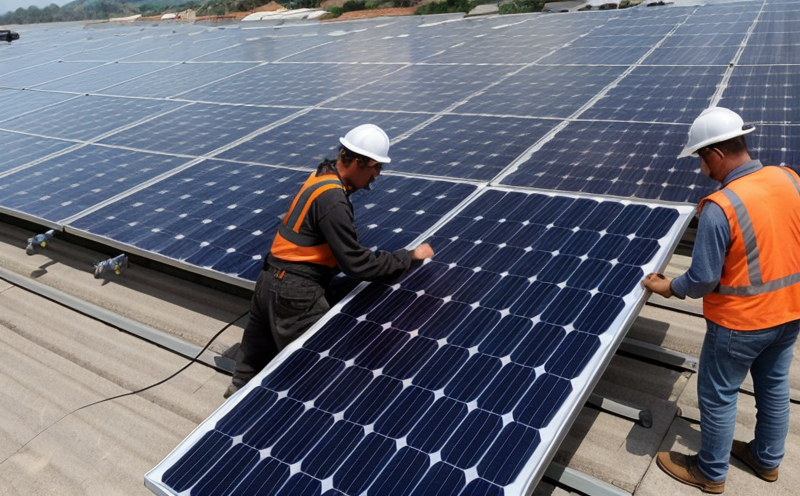
-
Renewable Energy Testing and Standards-
Solar Panel Manufacturing Standards and Certification-
Certification for Solar Panel Manufacturing Processes
We provide comprehensive solutions designed to help our clients mitigate risks, enhance performance, and excel in key areas such as quality, health & safety, environmental sustainability, and social responsibility.
Discover
For many years, our organization has been operating successfully, boasting modern laboratories that meet international standards. These laboratories are equipped with the latest technology devices and equipment, and we have built a strong team of experienced and trained personnel to operate them.
DiscoverWelcome to Eurolab, your partner in pioneering solutions that encompass every facet of life. We are committed to delivering comprehensive Assurance, Testing, Inspection, and Certification services, empowering our global clientele with the ultimate confidence in their products and processes.
Discover
-
Renewable Energy Testing and Standards-
Solar Panel Manufacturing Standards and Certification-
Certification for Solar Panel Manufacturing ProcessesCertification for Solar Panel Manufacturing Processes: Ensuring Quality and Efficiency
The solar panel manufacturing industry has experienced significant growth in recent years, driven by increasing demand for renewable energy sources and government incentives. However, with this growth comes the need for quality control measures to ensure that manufactured solar panels meet strict standards of efficiency, reliability, and safety. Certification programs play a vital role in ensuring that manufacturers adhere to these standards, which is crucial for maintaining public trust and confidence in the industry.
There are several certification bodies that provide accreditation for solar panel manufacturing processes, including the International Electrotechnical Commission (IEC), the Institute of Electrical and Electronics Engineers (IEEE), and the Solar Energy Industries Association (SEIA). These organizations establish standards and guidelines for manufacturing processes, materials, and testing procedures to ensure that solar panels meet specific requirements.
One of the key benefits of certification is that it ensures consistency in product quality. By adhering to established standards, manufacturers can guarantee that their products meet certain specifications and are safe for use. This not only enhances consumer confidence but also reduces the risk of costly recalls or failures.
Another significant advantage of certification is that it enables manufacturers to compete effectively in the global market. Certified manufacturers can demonstrate their commitment to quality and excellence, which can help them gain a competitive edge over non-certified competitors. Moreover, certification programs often provide training and education opportunities for manufacturers, enabling them to improve their processes and products.
Certification also promotes industry innovation and collaboration. By sharing knowledge and best practices, certified manufacturers can stay up-to-date with the latest developments in solar panel manufacturing technology. This fosters a culture of continuous improvement, driving innovation and efficiency within the industry.
Understanding Certification Requirements for Solar Panel Manufacturing
To achieve certification, manufacturers must meet specific requirements outlined by the certifying body. These requirements typically include:

Railway Industry Compliance
Railway Industry Compliance: Ensuring Safety and Efficiency The railway industry is a critical comp...

Construction and Engineering Compliance
Construction and Engineering Compliance: Ensuring Safety, Quality, and Regulatory Adherence In the ...

Pressure Vessels and Installations Testing
Pressure Vessels and Installations Testing Pressure vessels are a critical component of various ind...

Product and Retail Standards
Product and Retail Standards: Ensuring Quality and Safety for Consumers In todays competitive marke...

Environmental Simulation Testing
Environmental Simulation Testing: A Comprehensive Guide In todays world, where technology is rapidl...

Industrial Equipment Certification
Industrial equipment certification is a critical process that ensures industrial equipment meets spe...

Consumer Product Safety
Consumer Product Safety: Protecting Consumers from Harmful Products As a consumer, you have the rig...

Transportation and Logistics Certification
Transportation and Logistics Certification: A Comprehensive Guide The transportation and logistics ...

MDR Testing and Compliance
MDR Testing and Compliance: A Comprehensive Guide The Medical Device Regulation (MDR) is a comprehe...

Chemical Safety and Certification
Chemical safety and certification are critical in ensuring the safe management of products and proce...

NEBS and Telecommunication Standards
Network Equipment Building System (NEBS) and Telecommunication Standards The Network Equipment Bu...

Agricultural Equipment Certification
Agricultural equipment certification is a process that ensures agricultural machinery meets specific...

Fire Safety and Prevention Standards
Fire Safety and Prevention Standards: Protecting Lives and Property Fire safety and prevention stan...

Automotive Compliance and Certification
Automotive Compliance and Certification: Ensuring Safety and Efficiency The automotive industry is ...

Trade and Government Regulations
Trade and government regulations play a vital role in shaping the global economy. These regulations ...

Electrical and Electromagnetic Testing
Electrical and Electromagnetic Testing: A Comprehensive Guide Introduction Electrical and electrom...

Renewable Energy Testing and Standards
Renewable Energy Testing and Standards: Ensuring a Sustainable Future The world is rapidly transiti...

Military Equipment Standards
Military Equipment Standards: Ensuring Effectiveness and Safety The use of military equipment is a ...

Battery Testing and Safety
Battery Testing and Safety: A Comprehensive Guide As technology continues to advance, battery-power...

IT and Data Center Certification
IT and Data Center Certification: Understanding the Importance and Benefits The field of Informatio...

Lighting and Optical Device Testing
Lighting and Optical Device Testing: Ensuring Performance and Safety Lighting and optical devices a...

Pharmaceutical Compliance
Pharmaceutical compliance refers to the adherence of pharmaceutical companies and organizations to l...

Cosmetic Product Testing
The Complex World of Cosmetic Product Testing The cosmetics industry is a multi-billion-dollar ma...

Energy and Sustainability Standards
In today’s rapidly evolving world, businesses face increasing pressure to meet global energy a...

Electromechanical Safety Certification
Electromechanical Safety Certification: Ensuring Compliance and Protecting Lives In todays intercon...

Environmental Impact Assessment
Environmental Impact Assessment: A Comprehensive Guide Environmental Impact Assessment (EIA) is a c...

Aviation and Aerospace Testing
Aviation and Aerospace Testing: Ensuring Safety and Efficiency The aviation and aerospace industr...

Food Safety and Testing
Food Safety and Testing: Ensuring the Quality of Our Food As consumers, we expect our food to be sa...

Healthcare and Medical Devices
The Evolution of Healthcare and Medical Devices: Trends, Innovations, and Challenges The healthcare...

Hospitality and Tourism Certification
Hospitality and Tourism Certification: Unlocking Opportunities in the Industry The hospitality and ...